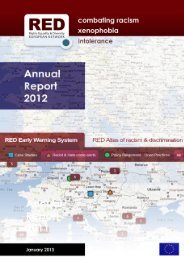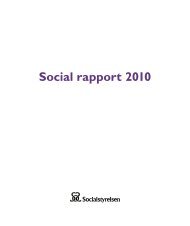Entry Testing and the Overrepresentation of Romani ... - UR Research
Entry Testing and the Overrepresentation of Romani ... - UR Research
Entry Testing and the Overrepresentation of Romani ... - UR Research
- No tags were found...
Create successful ePaper yourself
Turn your PDF publications into a flip-book with our unique Google optimized e-Paper software.
R5EXECUTIVE SUMMARYThis policy paper examines many <strong>of</strong> <strong>the</strong> ways in which <strong>Romani</strong> children from Central <strong>and</strong> South Eastern Europe aresegregated from <strong>the</strong>ir non-<strong>Romani</strong> peers <strong>and</strong> placed in special education. The focus <strong>of</strong> this paper is on schoolreadiness assessments (school entry testing) in <strong>the</strong> Czech Republic, Hungary, Serbia, <strong>and</strong> Slovakia, by which children’sentry to school is delayed, <strong>the</strong>y are streamed into preparatory or transition classes in special schools, or <strong>the</strong>y areplaced in special education classrooms or schools. This paper examines <strong>the</strong> link between such testing <strong>and</strong> <strong>the</strong>overrepresentation <strong>of</strong> <strong>Romani</strong> children in special education. The document also presents international good practice in<strong>the</strong> use <strong>of</strong> assessments for integrating ra<strong>the</strong>r than segregating children in order to address <strong>the</strong> individual educationalneeds <strong>of</strong> different pupils while mapping some potential directions for change in Central <strong>and</strong> South Eastern Europe.SCHOOL READINESS ASSESSMENT AND ITS USESA child is typically considered to be ready to attend school when he or she exhibits developmental maturity in hisor her social, cognitive, <strong>and</strong> physical abilities considered necessary for success in school. When such maturity ismeasured on <strong>the</strong> basis <strong>of</strong> st<strong>and</strong>ardized assessments, <strong>the</strong> burden <strong>of</strong> pro<strong>of</strong> is on <strong>the</strong> child; <strong>the</strong> child must demonstratehis or her readiness to attend school, but <strong>the</strong> school does not have to prove its readiness to accept <strong>the</strong> child <strong>and</strong>help him or her to develop needed skills. A central irony <strong>of</strong> entry testing is that <strong>the</strong> very children who would benefit<strong>the</strong> most from early school experiences may be denied those experiences on <strong>the</strong> basis <strong>of</strong> <strong>the</strong>ir test results.Assessment at <strong>the</strong> time <strong>of</strong> enrollment in primary education generally serves at least one <strong>of</strong> two purposes: diagnosingdisability <strong>and</strong> facilitating <strong>the</strong> inclusion <strong>of</strong> children in mainstream education. In most countries, including <strong>the</strong> CzechRepublic, Hungary, Serbia, <strong>and</strong> Slovakia, assessment procedures are designed primarily to serve <strong>the</strong> first purpose.Based on a medical model <strong>of</strong> disability, <strong>the</strong>se procedures result in <strong>the</strong> assignment to children <strong>of</strong> permanentdisability labels.Whereas nearly all countries use findings from assessments for diagnosing special educational needs requiringadditional resources, a much smaller proportion <strong>of</strong> countries also make use <strong>of</strong> assessment data for facilitatinginclusion <strong>of</strong> children in mainstream education through education plans or o<strong>the</strong>r strategies that take into accountchildren’s strengths <strong>and</strong> weaknesses as individual learners. Among countries in this group are Finl<strong>and</strong>, France,Italy, New Zeal<strong>and</strong>, <strong>the</strong> United Kingdom, <strong>and</strong> <strong>the</strong> United States. In all <strong>of</strong> <strong>the</strong>se countries, <strong>the</strong> presumption <strong>of</strong> relevantlegislation is that educational services for all children ought to be provided in st<strong>and</strong>ard schools <strong>and</strong> classrooms.Additionally, Finl<strong>and</strong>, France, New Zeal<strong>and</strong>, <strong>and</strong> <strong>the</strong> United Kingdom have abolished disability categories, effectivelyreplacing a diagnostic approach to assessment with a formative one.




